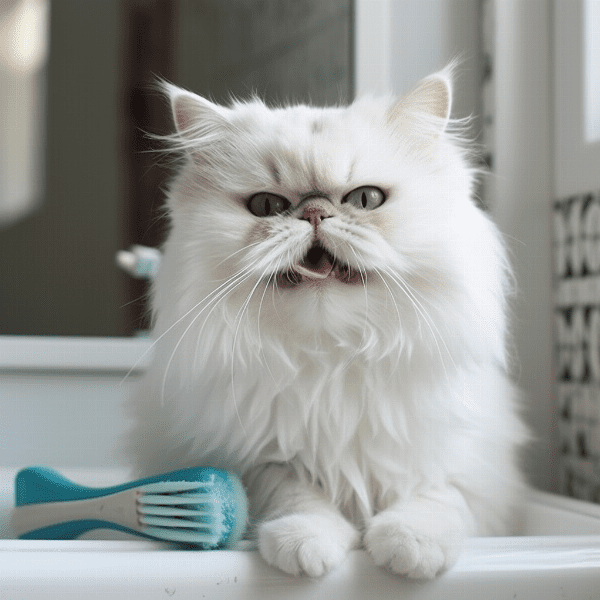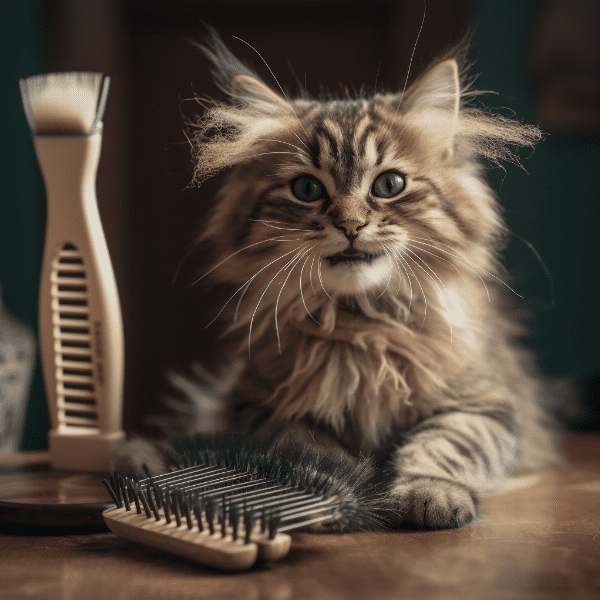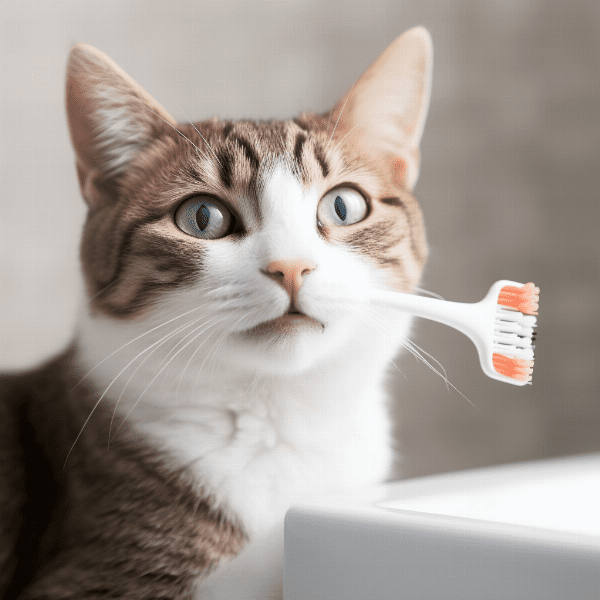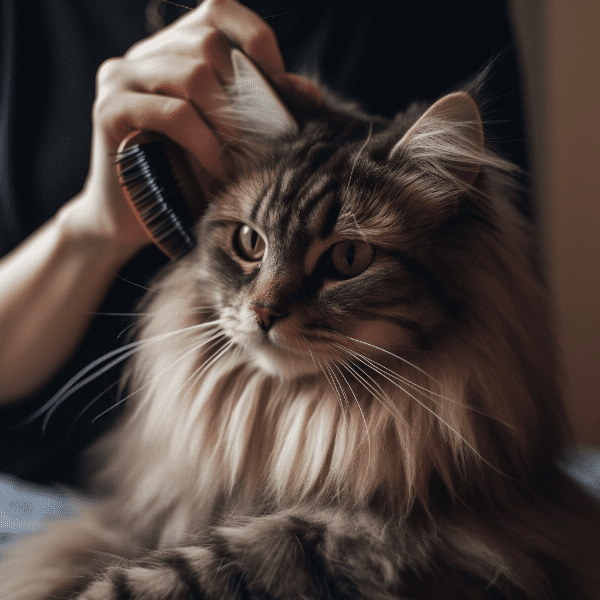Table of Contents
- Why Brushing Your Persian Cat’s Teeth is Important
- Getting Your Persian Cat Used to Tooth Brushing
- Choosing the Right Toothbrush and Toothpaste for Your Persian Cat
- Step-by-Step Guide to Brushing Your Persian Cat’s Teeth
- Tips for Making Tooth Brushing Easier and More Effective
- Common Mistakes to Avoid When Brushing Your Persian Cat’s Teeth
- Alternatives to Brushing Your Persian Cat’s Teeth
- When to Seek Veterinary Help for Your Persian Cat’s Dental Health
- Final Thoughts: Caring for Your Persian Cat’s Dental Health
Why Brushing Your Persian Cat’s Teeth is Important
As a Persian cat owner, you may wonder why brushing your feline friend’s teeth is necessary. After all, cats are known for their self-grooming habits, right? While it’s true that cats do groom themselves, their tongues are not designed to clean their teeth. In fact, cats can suffer from a variety of dental issues, just like humans. Here are some reasons why brushing your Persian cat’s teeth is crucial:
Preventing Dental Disease
Like humans, cats are prone to dental disease, such as periodontal disease and gingivitis. These conditions occur when plaque and tartar build-up on the teeth, leading to inflamed gums, bad breath, and eventually tooth loss. By regularly brushing your Persian cat’s teeth, you can remove plaque and prevent dental disease from developing.
Improving Overall Health
Did you know that dental disease can lead to other health issues in cats? Bacteria from dental infections can enter the bloodstream and affect the heart, liver, and kidneys. By keeping your Persian cat’s teeth clean, you can help prevent these potential health problems.
Saving Money on Vet Bills
Regular brushing can help you avoid expensive vet bills down the road. Dental procedures, such as extractions and cleanings, can be costly, and prevention is key. By taking care of your Persian cat’s teeth now, you can avoid more extensive and expensive dental treatments in the future.
In summary, brushing your Persian cat’s teeth is an essential part of their overall health and well-being. By preventing dental disease, improving their overall health, and saving money on vet bills, regular tooth brushing is a small but significant investment in your cat’s long-term health.
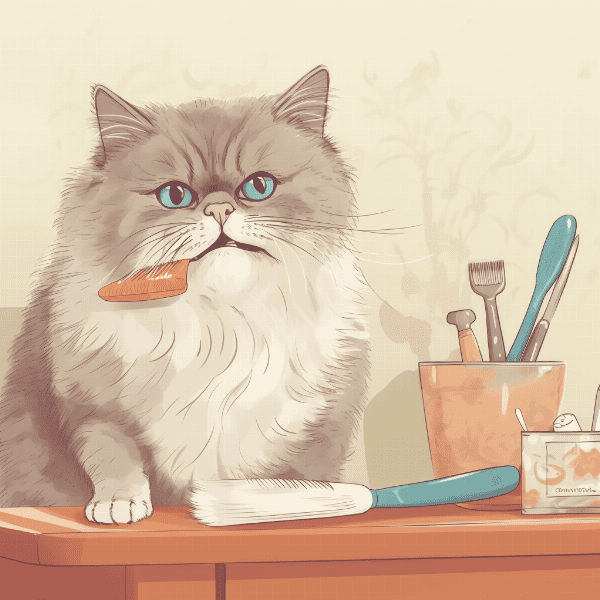
Getting Your Persian Cat Used to Tooth Brushing
If you’ve never brushed your Persian cat’s teeth before, you may be wondering how to get started. Here are some tips to help your feline friend get used to tooth brushing:
Start Slowly
Like with any new habit, it’s essential to start slowly and gradually build up to regular tooth brushing. Start by getting your Persian cat used to having their mouth touched. You can do this by gently rubbing their gums and teeth with your fingers.
Introduce Toothpaste
Once your cat is comfortable with having their mouth touched, you can introduce toothpaste. Choose a toothpaste that is specifically designed for cats, as human toothpaste can be harmful to them. Offer your cat a small amount of toothpaste on your finger and let them taste it.
Use Positive Reinforcement
Make tooth brushing a positive experience for your Persian cat by offering rewards such as treats or playtime. Start by brushing for just a few seconds and gradually increase the time as your cat becomes more comfortable.
Be Patient
It may take some time for your Persian cat to get used to tooth brushing. Be patient and don’t give up. With time and persistence, most cats can learn to tolerate or even enjoy tooth brushing.
By following these tips, you can help your Persian cat get used to tooth brushing and make it a positive experience for them. Remember, regular tooth brushing is essential for your cat’s dental and overall health, so it’s worth the effort to establish this habit.

Choosing the Right Toothbrush and Toothpaste for Your Persian Cat
Choosing the right toothbrush and toothpaste for your Persian cat can make a significant difference in the success of your tooth brushing routine. Here are some tips to help you make the right choices:
Toothbrush
Choose a toothbrush that is specifically designed for cats. Look for a brush with soft bristles that won’t damage your cat’s gums or teeth. You can choose between a finger brush that fits over your fingertip or a traditional brush with a handle.
Toothpaste
Select a toothpaste that is specifically formulated for cats. Human toothpaste can be harmful to cats, so it’s crucial to choose a cat-friendly option. Most cat toothpaste comes in flavors that cats enjoy, such as chicken or fish.
Size and Shape
Consider the size and shape of the toothbrush when making your choice. The brush should fit comfortably in your hand, and the bristles should be small enough to reach all of your cat’s teeth. If your Persian cat has a small mouth, a finger brush may be a better option.
Quality
Choose a toothbrush and toothpaste of good quality. Cheap, low-quality products may not be as effective or safe as higher-quality options. Investing in good quality toothbrushes and toothpaste can save you money on vet bills in the long run.
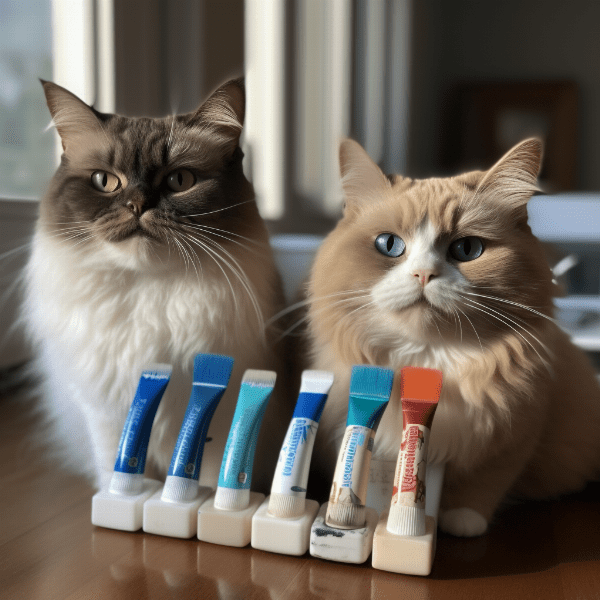
Step-by-Step Guide to Brushing Your Persian Cat’s Teeth
Brushing your Persian cat’s teeth can be a straightforward and effective process if done correctly. Here is a step-by-step guide to help you brush your cat’s teeth:
Step 1: Get Your Cat Comfortable
Before beginning, make sure your Persian cat is comfortable and relaxed. Choose a quiet, comfortable location to brush their teeth, and offer plenty of praise and positive reinforcement.
Step 2: Apply Toothpaste
Squeeze a small amount of toothpaste onto the bristles of the toothbrush. Let your cat smell and taste the toothpaste before starting to brush.
Step 3: Start Brushing
Gently lift your cat’s lip and start brushing their teeth with a circular motion. Focus on the outside of the teeth where plaque and tartar tend to build up.
Step 4: Be Gentle
Be gentle and patient with your Persian cat, especially if they are new to tooth brushing. If your cat seems uncomfortable or stressed, stop and try again later.
Step 5: Reward Your Cat
Offer praise and rewards throughout the brushing process. You can offer treats or playtime as a positive reinforcement.
Step 6: Rinse
After brushing, use a damp cloth or gauze to wipe your cat’s teeth and remove any excess toothpaste.
Step 7: Repeat
Repeat the tooth brushing process at least three times per week to maintain your Persian cat’s dental health.
By following these simple steps, you can effectively brush your Persian cat’s teeth and help prevent dental disease. Remember, consistency and patience are key, and with time and practice, your cat can learn to enjoy tooth brushing.
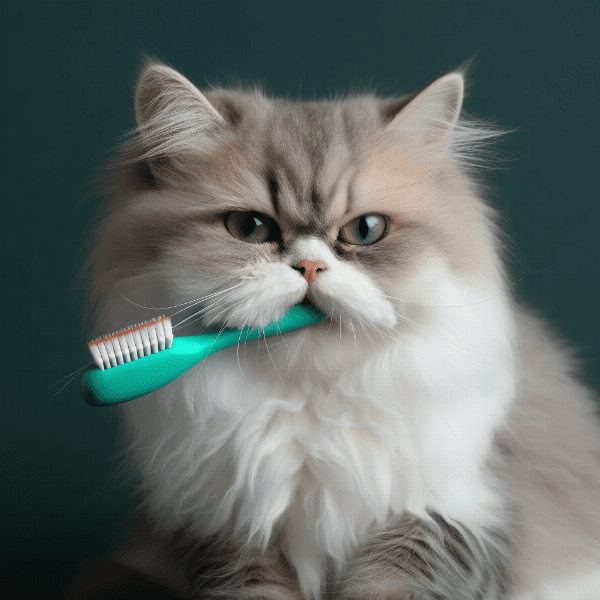
Tips for Making Tooth Brushing Easier and More Effective
Brushing your Persian cat’s teeth can be a challenging task, but there are several tips and tricks that can make the process easier and more effective. Here are some tips to consider:
Start Young
The earlier you start brushing your Persian cat’s teeth, the easier it will be to establish the habit. Try to start when your cat is still a kitten, so they can become accustomed to tooth brushing as a part of their routine.
Use Treats
Offer your Persian cat treats before, during, and after tooth brushing to create a positive association with the activity. This can help them feel more comfortable and cooperative during tooth brushing sessions.
Be Gentle
Use a soft-bristled toothbrush and gentle circular motions to brush your cat’s teeth. Avoid scrubbing too hard or being too forceful, as this can cause discomfort and make your cat less cooperative.
Consider Alternative Approaches
If your Persian cat simply won’t tolerate tooth brushing, there are alternative approaches you can consider. Dental chews, water additives, and special diets can all help improve your cat’s dental health.
Be Consistent
Consistency is key when it comes to brushing your cat’s teeth. Try to establish a regular routine and stick to it as closely as possible. This can help your cat become more comfortable and cooperative over time.

Common Mistakes to Avoid When Brushing Your Persian Cat’s Teeth
Brushing your Persian cat’s teeth can be a challenging task, and there are several common mistakes that cat owners often make. Here are some mistakes to avoid when brushing your cat’s teeth:
Mistake 1: Using Human Toothpaste
Human toothpaste can be harmful to cats, as it contains ingredients that are toxic to them. Always use toothpaste that is specifically formulated for cats.
Mistake 2: Brushing Too Hard
Brushing your cat’s teeth too hard or using a brush with stiff bristles can cause discomfort and damage to their teeth and gums. Use a soft-bristled brush and gentle circular motions.
Mistake 3: Skipping Brushing Sessions
Consistency is key when it comes to brushing your Persian cat’s teeth. Skipping sessions can lead to plaque buildup, gingivitis, and other dental issues. Try to establish a regular routine and stick to it.
Mistake 4: Not Rewarding Your Cat
Positive reinforcement is essential when it comes to tooth brushing. Offer treats, playtime, and praise to create a positive association with the activity.
Mistake 5: Rushing the Process
Rushing the tooth brushing process can cause stress and discomfort for your Persian cat. Take your time, be patient, and be gentle with your cat.
Mistake 6: Neglecting Other Dental Care
Brushing your cat’s teeth is essential, but it’s not the only aspect of dental care. Make sure your Persian cat has access to clean water and considers dental chews, water additives, and special diets as part of their dental care routine.
By avoiding these common mistakes, you can make tooth brushing a more comfortable and effective experience for your Persian cat. Remember, dental health is a crucial part of your cat’s overall health, so it’s worth taking the time to establish a regular tooth brushing routine and avoid these common mistakes.
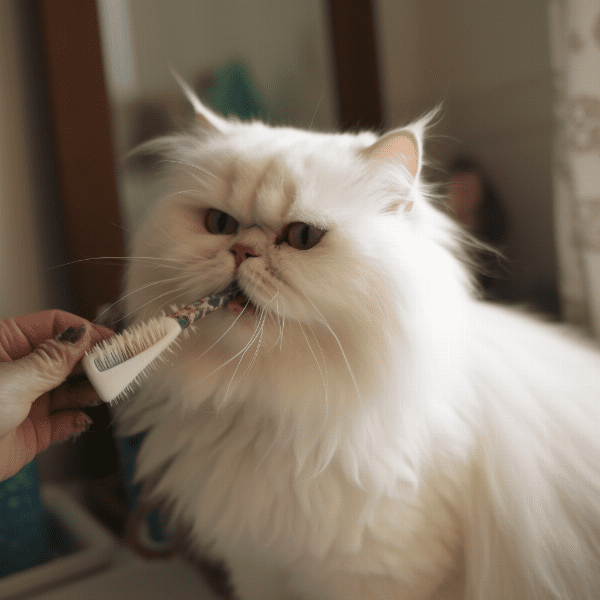
Alternatives to Brushing Your Persian Cat’s Teeth
While tooth brushing is the most effective way to keep your Persian cat’s teeth clean and healthy, it’s not always feasible. Here are some alternatives to tooth brushing that can help improve your cat’s dental health:
Dental Chews
Dental chews are specially formulated treats that can help remove plaque and tartar buildup from your cat’s teeth. They come in a variety of flavors and sizes and can be a tasty and effective way to supplement your cat’s dental care routine.
Water Additives
Water additives are a simple way to improve your cat’s dental health. These additives are added to your cat’s water bowl and can help prevent plaque and tartar buildup.
Special Diets
Special diets, such as those designed for dental health, can help improve your cat’s dental health. These diets are formulated with ingredients that help remove plaque and tartar buildup and can be a convenient alternative to tooth brushing.
Professional Dental Cleanings
If your cat’s dental health is severely compromised, professional dental cleanings may be necessary. Your veterinarian can perform a thorough dental cleaning under anesthesia to remove tartar and plaque buildup and restore your cat’s dental health.
While tooth brushing is the best way to keep your cat’s teeth clean and healthy, these alternatives can help supplement your cat’s dental care routine. Talk to your veterinarian to determine the best approach for your Persian cat’s dental health.
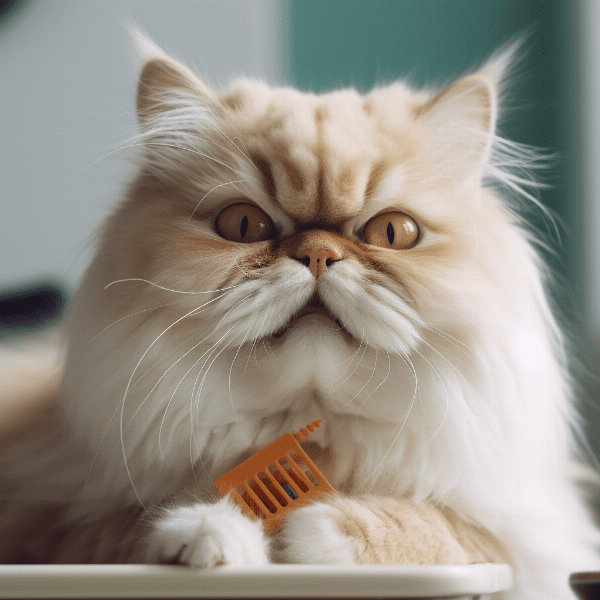
When to Seek Veterinary Help for Your Persian Cat’s Dental Health
Regular tooth brushing and other dental care can go a long way in keeping your Persian cat’s teeth healthy. However, there are some situations when veterinary help is necessary. Here are some signs that you should seek veterinary help for your cat’s dental health:
Signs of Pain or Discomfort
If your Persian cat seems to be in pain or discomfort, it could be a sign of dental issues such as gingivitis, periodontal disease, or a tooth abscess. Signs of pain or discomfort can include reluctance to eat, pawing at the mouth, drooling, or vocalizing when eating or drinking.
Bad Breath
Bad breath is a common sign of dental issues in cats. While some cats may have mild bad breath, persistent or foul-smelling breath could be a sign of dental disease.
Changes in Eating or Drinking Habits
If your Persian cat suddenly starts eating or drinking less, it could be a sign of dental issues such as pain, discomfort, or difficulty chewing.
Visible Signs of Dental Issues
If you notice visible signs of dental issues, such as red or bleeding gums, tartar buildup, or loose or broken teeth, it’s time to seek veterinary help.
If you notice any of these signs in your Persian cat, it’s essential to seek veterinary help. Your veterinarian can perform a thorough dental exam, recommend appropriate treatments, and help you establish a dental care routine to prevent future dental issues.
In conclusion, regular dental care is crucial for your Persian cat’s overall health and well-being. If you notice any signs of dental issues, seek veterinary help promptly to prevent further complications.

Final Thoughts: Caring for Your Persian Cat’s Dental Health
Caring for your Persian cat’s dental health is an essential aspect of their overall health and well-being. Here are some final thoughts to keep in mind:
Prevention is Key
Preventing dental issues is much easier than treating them. Regular tooth brushing, dental chews, and other dental care can go a long way in preventing dental issues in your Persian cat.
Consistency is Essential
Consistency is crucial when it comes to your cat’s dental care routine. Establish a regular routine and stick to it as closely as possible.
Seek Veterinary Help When Necessary
If you notice any signs of dental issues in your Persian cat, seek veterinary help promptly. Early detection and treatment can prevent further complications and improve your cat’s overall health.
Don’t Give Up
Tooth brushing can be a challenging task, especially if your Persian cat is resistant. Don’t give up, be patient, and keep trying. With time and patience, most cats can learn to tolerate or even enjoy tooth brushing.
By following these tips and establishing a regular dental care routine, you can help keep your Persian cat’s teeth healthy and prevent dental issues. Remember, dental health is a crucial part of your cat’s overall health and well-being, so it’s worth taking the time and effort to establish good dental care habits.
